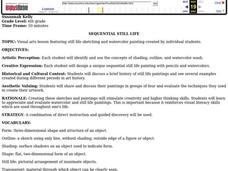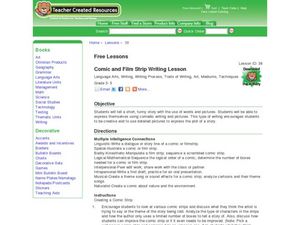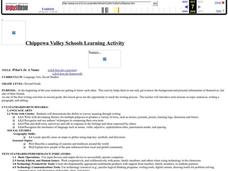Curated OER
Writing Catchy Introductions
In this introductory paragraph worksheet, students learn techniques for writing an attention-catching introductory paragraph. Students then read several introductory paragraphs and determine which strategies were used.
Curated OER
Yes, You Can!
Students examine the concept of encouragement. For this encouragement and character lesson, students participate in an active read aloud of Mary Grace's, Amazing Grace. They draw a picture in their journal of a time that they needed...
Curated OER
Valerie Bloom Poetry
Learners listen to Granny Is, a poem by Valerie Bloom and discuss the metaphors in the poem. In this poetry lesson, students read poetry written by Valerie Bloom and discuss the techniques she uses. Learners write grandmother poems.
Curated OER
Four Armed Men From the Renaissance!
Students study the Renaissance and the important art from the period. In this Renaissance lesson, students discuss the black plague and religion during the Renaissance. Students read the Renaissance worksheet and learn vocabulary words...
Curated OER
Easter Baskets
Students create Easter baskets using paperclips, string, balloons, and paper mache techniques in this early-elementary Art lesson plan. Due to drying times for the paper mache it is recommended to spread this Art lesson plan over at...
Curated OER
Word Play
Students explore the work of Xu Bing. In this visual arts lesson, students examine the art piece "Monkeys Grasp for the Moon" and compare it to the Buddhist folktale on which it is based. Students create animated flip books based on the...
Curated OER
Clay Sculpture: Relationships
Students explore art history by conducting an in-class activity. In this sculpting lesson, students examine previously created art sculptures in a textbook. Students utilize clay, sculpting tools and grey paper to create their own...
Curated OER
Sequential Still Life
Sixth graders engage in a visual arts lesson featuring still life sketching and watercolor painting created by individual students.
Curated OER
Printmaking Monoprints
Students learn the concept of monoprint and explore different methods of making prints. They also examine how an image in print is reversed. The exploration of non-objective art is used to help students utilize principles to create artwork.
Curated OER
Dance Transitions
Students create a small group dance that addresses free-flowing techniques and transitions for in-class performance. This activity meets state arts standards and includes rubric for assessment.
Curated OER
Comic and Film Strip Writing
Young scholars write a funny story and illustrate it in a comic strip. In this comic strip lesson, students study comic strips and determine the plot of each story. Young scholars then write a short story and illustrate it using a comic...
Curated OER
Ceramic Rattles
Learners create ceramic rattles using the pinch method of building with clay. They view a slide show of different types of rattles, draw designs of their rattles, and create them using clay and the pinch method. They create the rattles...
Curated OER
Alliterations Allowed
Fourth graders recognize and create alliterative language in both literary and commercial use. In this language arts lesson, 4th graders analyze pieces of poetry and focus on the use of imagery, personification, and figures of speech.
Curated OER
What's In A Name
Second graders write a paragraph about their findings on what their name represents. In this writing lesson plan, 2nd graders will research their name and why they were named that. They will draw a picture that represents them along with...
Curated OER
A Visit to the Vet
Learners identify the differences and similarities between doctors for humans and veterinarians. Students draw a pet's visit to the veterinarian's office and a person's visit to a doctor's office. Learners describe exactly what they have...
Pennsylvania Department of Education
6 Traits: Word Choice
Students explore language arts by participating in a vocabulary usage activity. In this word choice lesson, students read examples of great word usage in literature and discuss with the class why some words appear stronger than others....
Curated OER
Writing Comics (3+)
Students examine comic strips and evaluate the techniques used to create them. They design their own comics as a continuation of the ones they read, or they create their own characters.
Curated OER
Parliamentary Newsroom : Developing Media Literacy
High schoolers explain and examine the selection, development, sources, transmission and impact of news on the public. They write a brief essay on the topic: "The Public Must Be Critical In Their Assessment of the News Before Drawing...
Curated OER
Comparing Patterns In Chinese And American Textile
Students create Chinese jacket designs using magic markers and paper jackets as well as knowledge of Chinese and American textile designs and techniques in this upper-elementary lesson.
Curated OER
Super Duper Summarizer!!!
Third graders review the technique of silent reading and study how to summarize what they read. Next, they examine the five steps to summarize a passage and apply it to a reading of Patricia Nikolina Clark's, "Mr. Pilling's Pond." Using...
Curated OER
The Bear Facts About Summarization
Learners practice summarizing techniques in this lesson plan. They listen as the teacher reads from a non-fiction article, and the class creates a story map to highlight the most important facts from the article. They use the map to...
Curated OER
Picture This!
Students practice visualizing images as they read text to help improve their comprehension skills. The teacher models a visualizing technique, and the passes out two poems for the students to read silently. The class creates a Venn...
Curated OER
Our Friends b and d
Learners practice a variety of techniques and strategies to assess the differences between the lowercase letters b and d. They listen to and identify the letters b and d in the book, "Bud the Sub," and then play a game to master this skill.
Curated OER
Editorial Cartoon: Censorship
Students explore the concept of juxtaposition. In this editorial cartoon instructional activity, students analyze an editorial cartoon techniques to develop an understanding of juxtaposition and symbolism used in the cartoons.

























